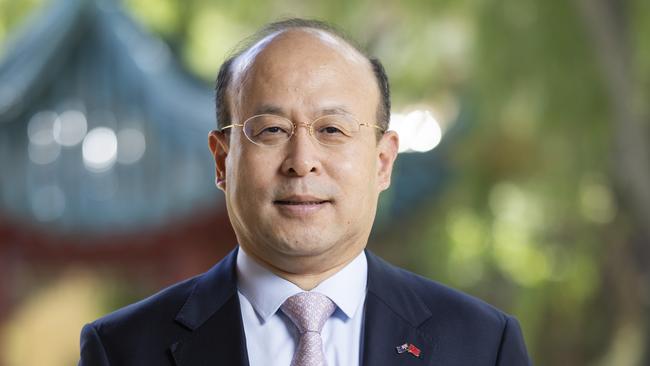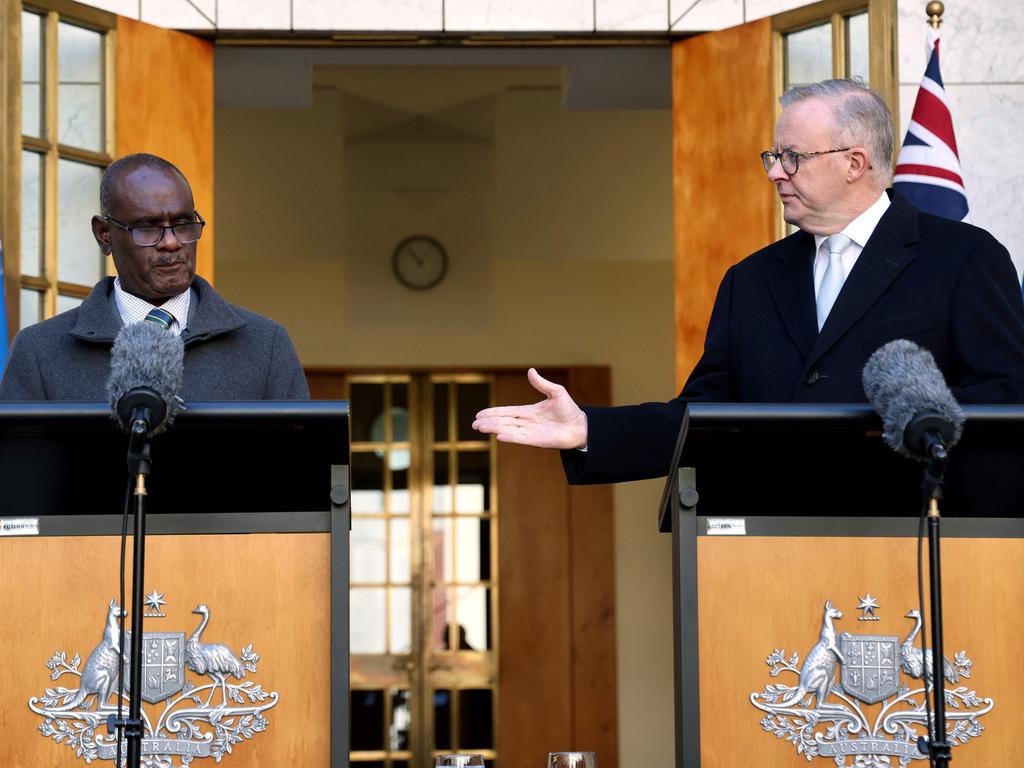Respect our territorial claims, says Chinese ambassador Xiao Qian
China’s top diplomat in Canberra has challenged Australia to remedy ‘misunderstandings’ on Taiwan and show ‘respect’ for Beijing’s territorial claims in the South China Sea.

China’s top diplomat in Canberra has challenged Australia to remedy what he says are “misunderstandings” on Taiwan and show “respect” for Beijing’s territorial claims in the South China Sea, just days after his country removed its last trade ban on Australian exports.
In an exclusive interview following the resumption of the live lobster trade, ambassador Xiao Qian also accused the Australian Strategic Policy Institute of encouraging “negative” views on China, as the think tank warns its independence was under threat following a government-ordered review.
Mr Xiao welcomed the trade milestone, approved by Beijing last week, declaring a “full turnaround” had been achieved in bilateral ties.
But he said the nations continued to have differences that needed to be managed “wisely”, including on the question of Taiwan. “I have a very strong impression that there are people in this country who have misunderstandings about Taiwan,” Mr Xiao said this week.
Australia’s longstanding one-China policy does not recognise Taiwan as a country but supports unofficial trade and cultural ties with the self-governed territory.
But Mr Xiao said he believed some in Australia viewed it as a sovereign state, despite widespread international recognition that Taiwan was “part of China”.
“This is a misunderstanding that … needs to be corrected,” Mr Xiao said.
The future of Taiwan looms as the Indo-Pacific’s biggest security issue, with Mr Xiao reiterating Beijing’s position that it sought peaceful reunification with the territory but “cannot give up the choice of resorting to force”.
On the region’s other key security hotspot, Mr Xiao declared: “Australia is not a party to the South China Sea issue and should respect China’s sovereignty and the common interests of regional countries.”
His comments, months before a federal election, underscore deep divisions between Australia and its major trading partner as Donald Trump’s imminent return to the White House injects fresh uncertainty into US-China relations.
Taiwan’s representative in Australia, Douglas Hsu, said the territory was facing a campaign of “cognitive warfare” by China, but it remained “a vibrant democracy and a global economic powerhouse”.
“Since Taiwan is a democracy, anything regarding Taiwan’s future needs to be determined by the willingness of the Taiwanese people,” Mr Hsu said.
The Albanese government has worked to stabilise ties with China while opposing “unilateral changes to the status quo” in relation to Taiwan. It has also stated with key partners that Beijing’s territorial claims in the South China Sea are inconsistent with international law, backing the position with joint freedom-of-navigation operations with the US, Japan and The Philippines.
Mr Xiao said exercises in the South China Sea by “non-regional countries … threaten peace and stability”.
He said ASPI, which faces the axing of its Washington office and increased government oversight after the Varghese review, had fostered views that he said were “pretty negative on China”.
“Many of their views are based on a Cold War mentality that China is growing and China is growing strongly, so China is going to challenge the existing international order,” Mr Xiao said.
He argued that these were also “misunderstandings”.
But ASPI’s executive director Justin Bassi said the think tank, which Beijing singled out in its 2020 list of “grievances” with Australia, would continue its “data driven and objective research” to “pour sunlight on all malicious actions”. “That a think tank lives in the heads of the regime of the second biggest economy and military in the world shows ASPI’s global influence and Beijing’s extreme sensitivity to criticism,” he said.
Mr Xiao will mark three years in his post in January amid speculation in Canberra’s diplomatic circles that his term may soon come to an end. But he said he was yet to receive directions from Beijing on whether he would stay on in Canberra or return home.
Former Defence official Michael Shoebridge said there was no mistaking China’s position on the region’s most pressing security issues. “I don’t think there is a misunderstanding about Beijing’s intentions towards Taiwan, or its outrageous claim of extensive sovereignty over the South China Sea,” he said.
Labor senator Raff Ciccone, who chairs federal parliament’s intelligence committee, said in a recent speech that Taiwan was a “robust” democracy and “a friend and a partner” to Australia.
The removal of China’s bans on Australian lobster on the Friday before Christmas marked the end of Beijing’s $20bn a year in trade sanctions against Australia after bilateral relations soured during the Covid pandemic.
The outcome followed painstaking diplomacy by the Albanese government to take the heat out of the China relationship with its policy to “co-operate where we can, disagree where we must, and engage in the national interest”.
Australia’s major political parties used a bipartisan Senate motion in August to reject Beijing’s use of a five-decade-old UN resolution to press its claim over Taiwan.
The 1971 resolution recognises the People’s Republic of China as “the only legitimate representative of China to the UN”. But Labor and Coalition senators declared UN Resolution 2758 “does not establish the People’s Republic of China’s sovereignty over Taiwan”.







To join the conversation, please log in. Don't have an account? Register
Join the conversation, you are commenting as Logout